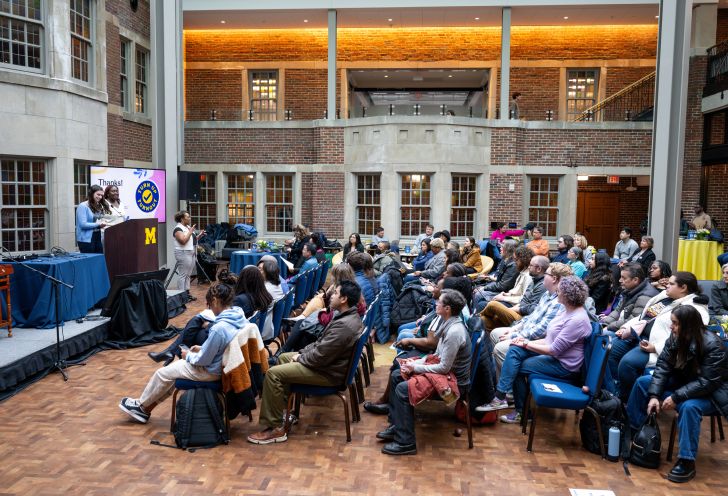Student Minoritized Representation
Click the image below to expand
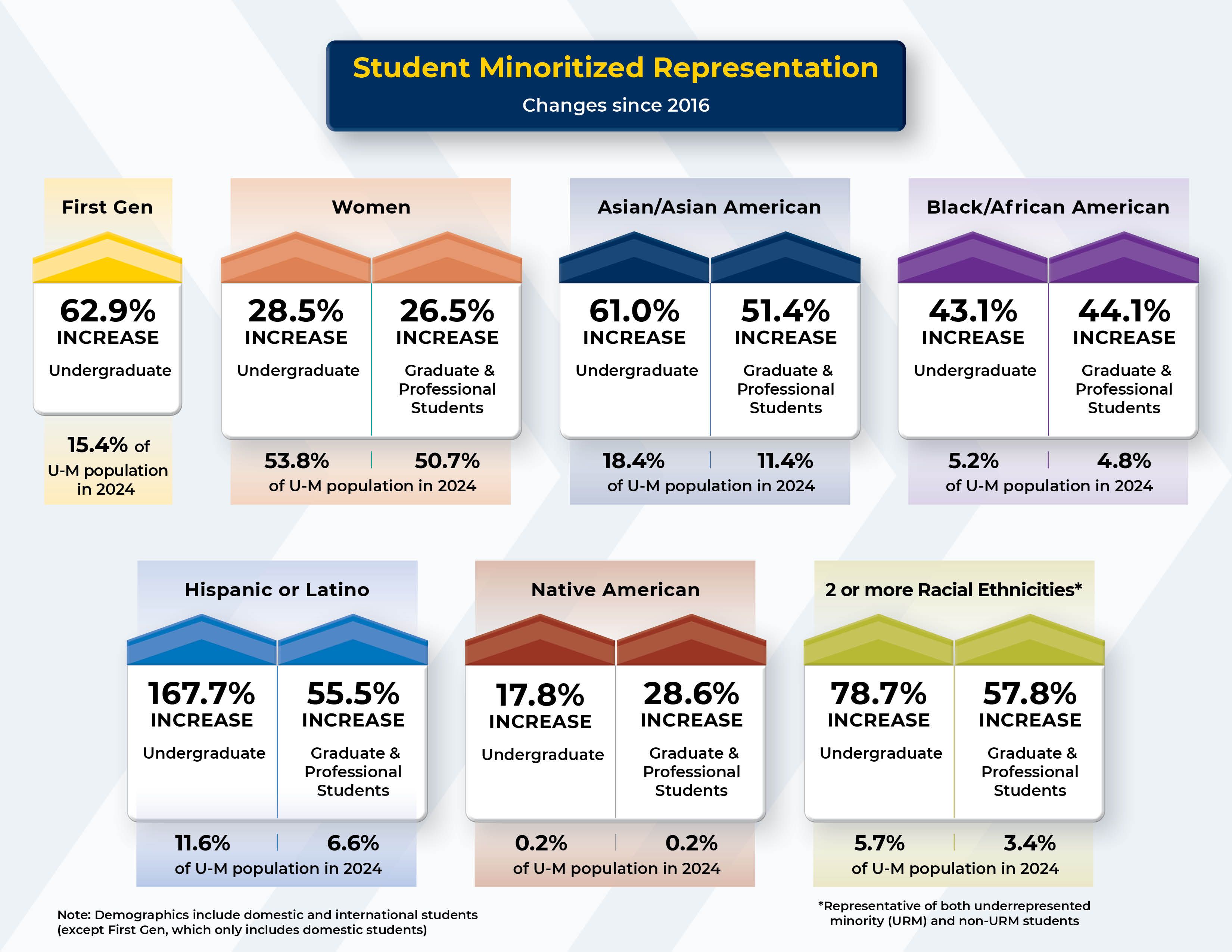
Text description of Student Minoritized Representation graphic
The Student Minoritized Representation infographic provides an overview of changes to the student population within seven key demographics over DEI 2.0.
(1) Demographics for First-Generation students reports a 62.9% increase in undergraduate students (15.4% of U-M population in 2024).
(2) Demographics for women reports a 28.5% increase in undergraduate students (53.8% of U-M population in 2024) and a 26.5% increase in graduate and professional students (50.7% of U-M population in 2024).
(3) Demographics for Asian/Asian Americans report a 61.0% increase in undergraduate students (18.4% of U-M population in 2024) and a 51.4% increase in graduate and professional students (11.4% of U-M population in 2024).
(4) Demographics for Black/African Americans report a 43.1% increase in undergraduate students (5.2% of U-M population in 2024) and a 44.1% increase in graduate and professional students (4.8% of U-M population in 2024).
(5) Demographics for Hispanic or Latino report a 167.7% increase in undergraduate students (11.6% of U-M population in 2024) and a 55.5% increase in graduate and professional students (6.6% of U-M population in 2024).
(6) Demographics for Native Americans reports a 1 7.8% increase in undergraduate students (0.2% of U-M population in 2024) and a 28.6% increase in graduate and professional students (0.2% of U-M population in 2024).
(7) Demographics for Two or More Racial Ethnicities reports a 78.7% increase in undergraduate students (5.7% of U-M population in 2024) and a 57.8% increase in graduate and professional students (3.4% of U-M population in 2024).
Notes: (1) Demographics Include domestic and International students (except First Gen, which only includes domestic students). (2) The Racial Ethnicities demographic is representative of both underrepresented minority and non-underrepresented minority students.
Faculty Minoritized Representation
Click the image below to expand
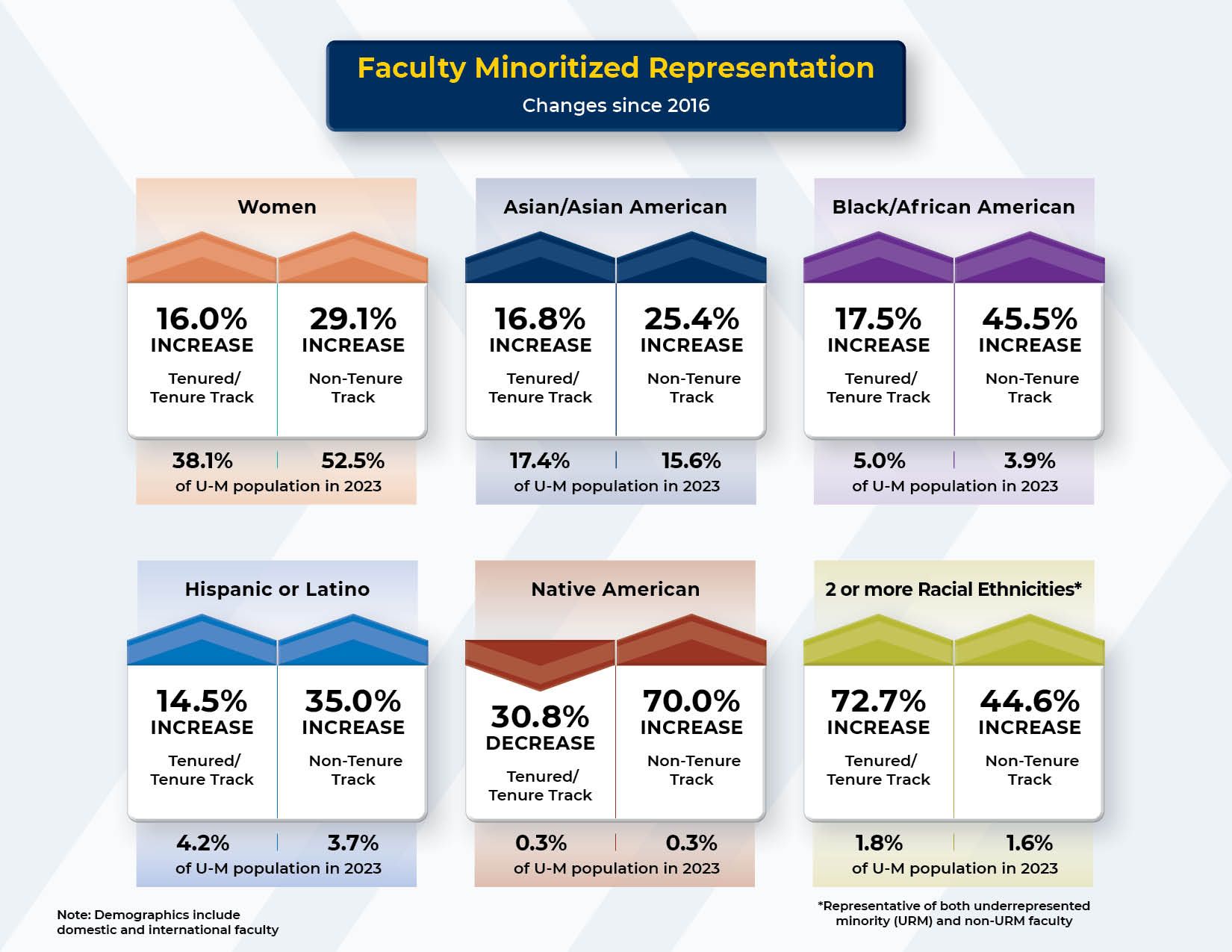
Text description of Faculty Minoritized Representation graphic
The Faculty Minoritized Representation infographic provides an overview of changes to the faculty population within six key demographics over DEI 2.0.
(1) Demographics for women reports a 16.0% increase in tenured/tenure track faculty (38.1% of U-M population in 2023) and a 29.1% increase in non-tenure track faculty (52.5% of U-M population in 2023).
(2) Demographics for Asian/Asian Americans report a 16.8% increase in tenured/tenure track faculty (17.4% of U-M population in 2023) and a 24.5% increase in non-tenure track faculty (15.6% of U-M population in 2023).
(3) Demographics for Black/African Americans report an 17.5% increase in tenured/tenure track faculty (5.0% of U-M population in 2023) and a 45.5% increase in non-tenure track faculty (3.9% of U-M population in 2023).
(4) Demographics for Hispanic or Latino reports a 14.5% increase in tenured/tenure track faculty (4.2% of U-M population in 2023) and a 35.0% increase in non-tenure track faculty (3.7% of U-M population in 2023).
(5) Demographics for Native Americans reports a 30.8% decrease in tenured/tenure track faculty (0.3% of U-M population in 2023) and a 70.0% increase in non-tenure track faculty (0.3% of U-M population in 2023).
(6) Demographics for Two or More Races reports a 72.7% increase in tenured/tenure track faculty (1.3% of U-M population in 2023) and a 44.6% increase in non-tenure track faculty (1.6% of U-M population in 2023).
Staff Minoritized Representation
Click the image below to expand
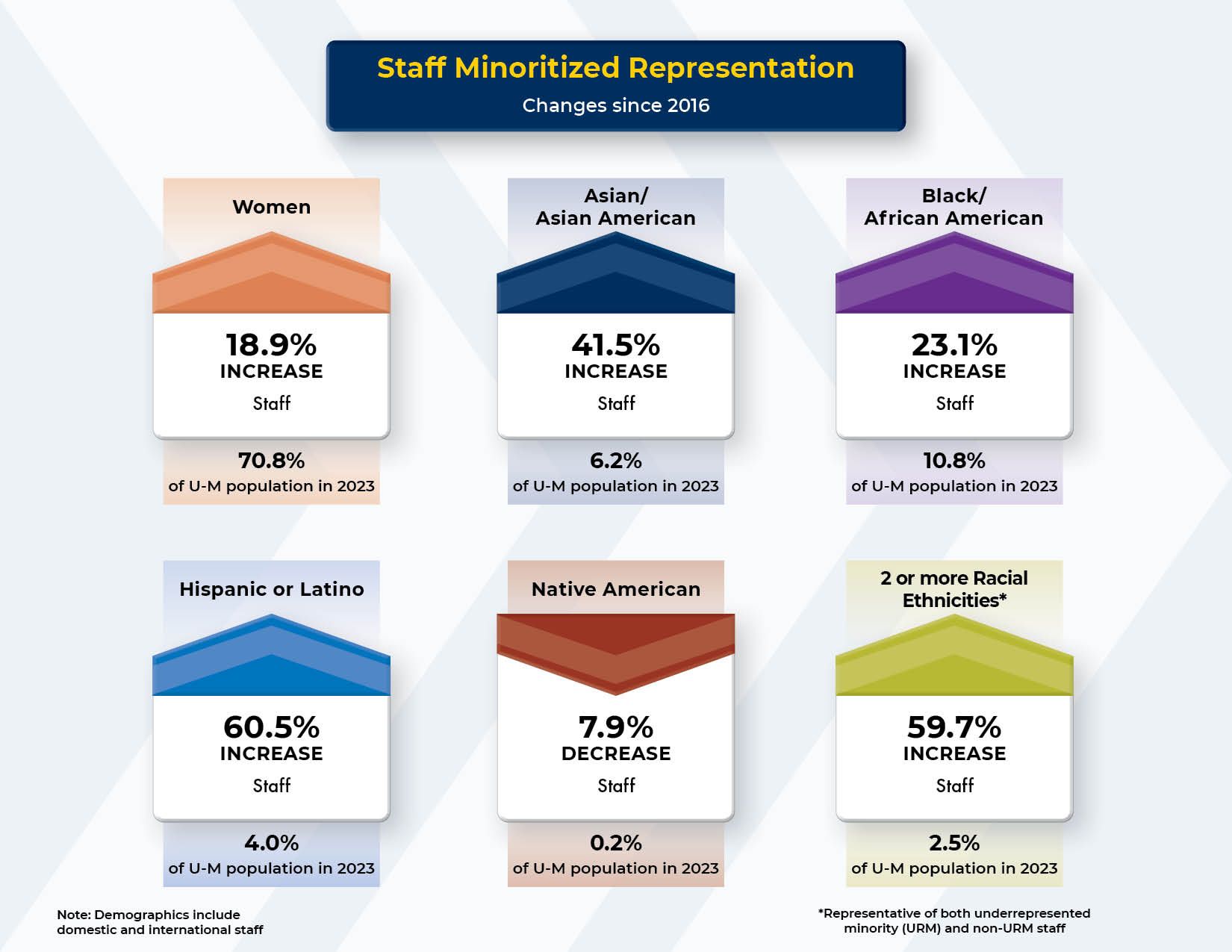
Text description of Staff Minoritized Representation graphic
The Staff Minoritized Representation infographic provides an overview of changes to the staff population within six key demographics over DEI 2.0.
(1) Demographics for women reports a 18.9% increase in staff (70.8% of U-M population in 2023).
(2) Demographics for Asain/Asian Americans reports a 41.5% increase in staff (6.2% of U-M population in 2023).
(3) Demographics for Black/African Americans reports a 23.1% increase in staff (10.8% of U-M population in 2023).
(4) Demographics for Hispanics or Latinos report a 60.5% increase in staff (4.0% of U-M population in 2023).
(5) Demographics for Native Americans report a 7.9% decrease in staff (0.2% of U-M population in 2023).
(6) Demographics for Two or More Racial Ethnicities reports a 59.7% increase in staff (2.5% of U-M population in 2023).
Affordability & Socioeconomic Diversity at U-M
Click the image below to expand
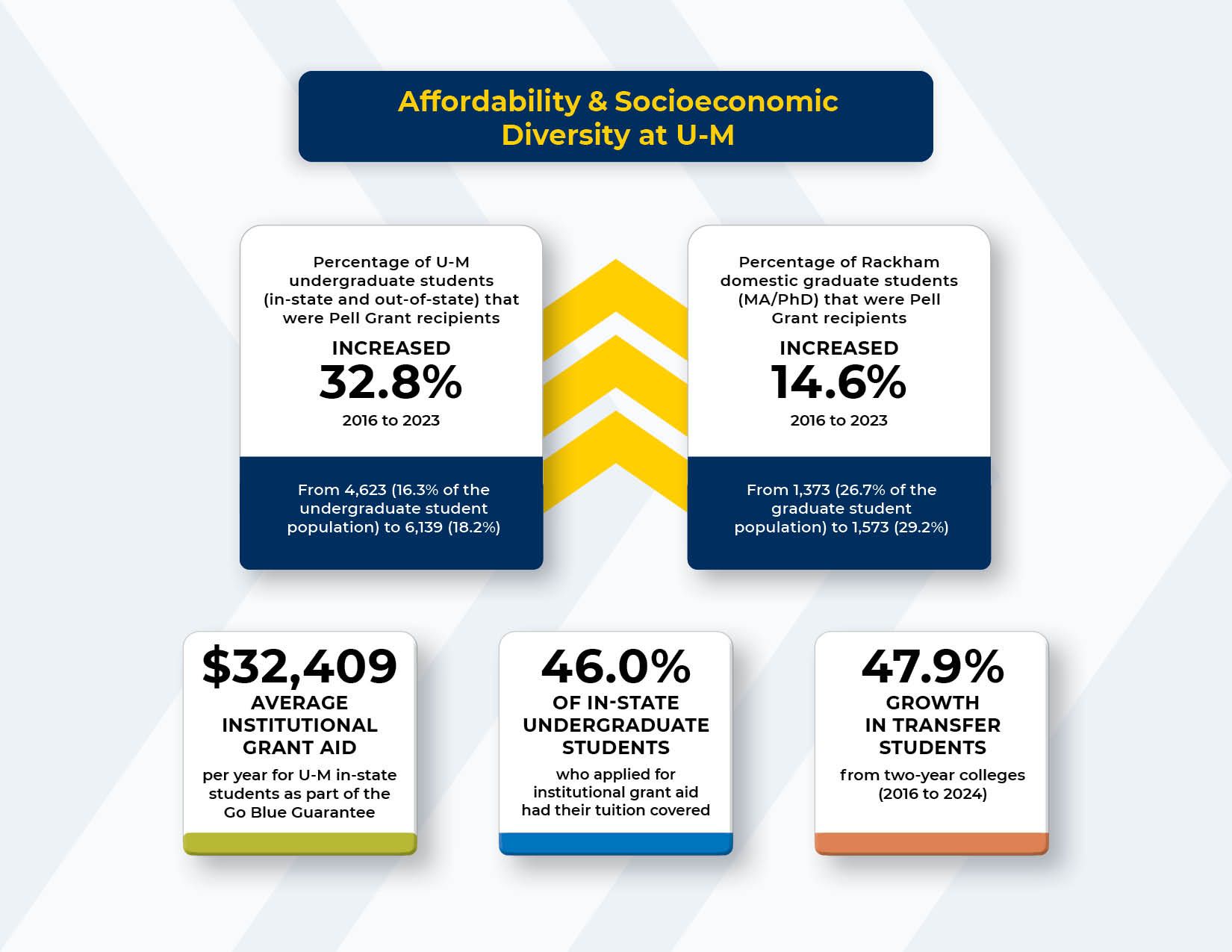
Text description of Affordability & Socioeconomic Diversity at U-M graphic
Affordability and Socioeconomic Diversity continue to improve as financial programs help to remove barriers for students who seek to attend the University of Michigan.
Five key data points inform on the progress of Affordability and Socioeconomic Diversity at the University of Michigan:
(1) In- and Out-of-state undergraduate Pell Grant recipients increased 32.8%, from 4,623 (16.3% of the undergraduate student population) to 6,149 (18.2%).
(2) Domestic Rackham graduate student Pell Grant recipients increased 14.6% From 1,373 (26.7% of the graduate student population) to 1,573 (29.2%).
(3) The average Institutional Grant Aid is $32,409 per year for in-state students as part of the Go Blue Guarantee program.
(4) 46% of in-state undergraduate students who applied for institutional grant aid had their tuition covered.
(5) The university reports a 47.9% increase in transfer students from two-year colleges (2016 to 2024).
Wolverine Pathways
Click the image below to expand
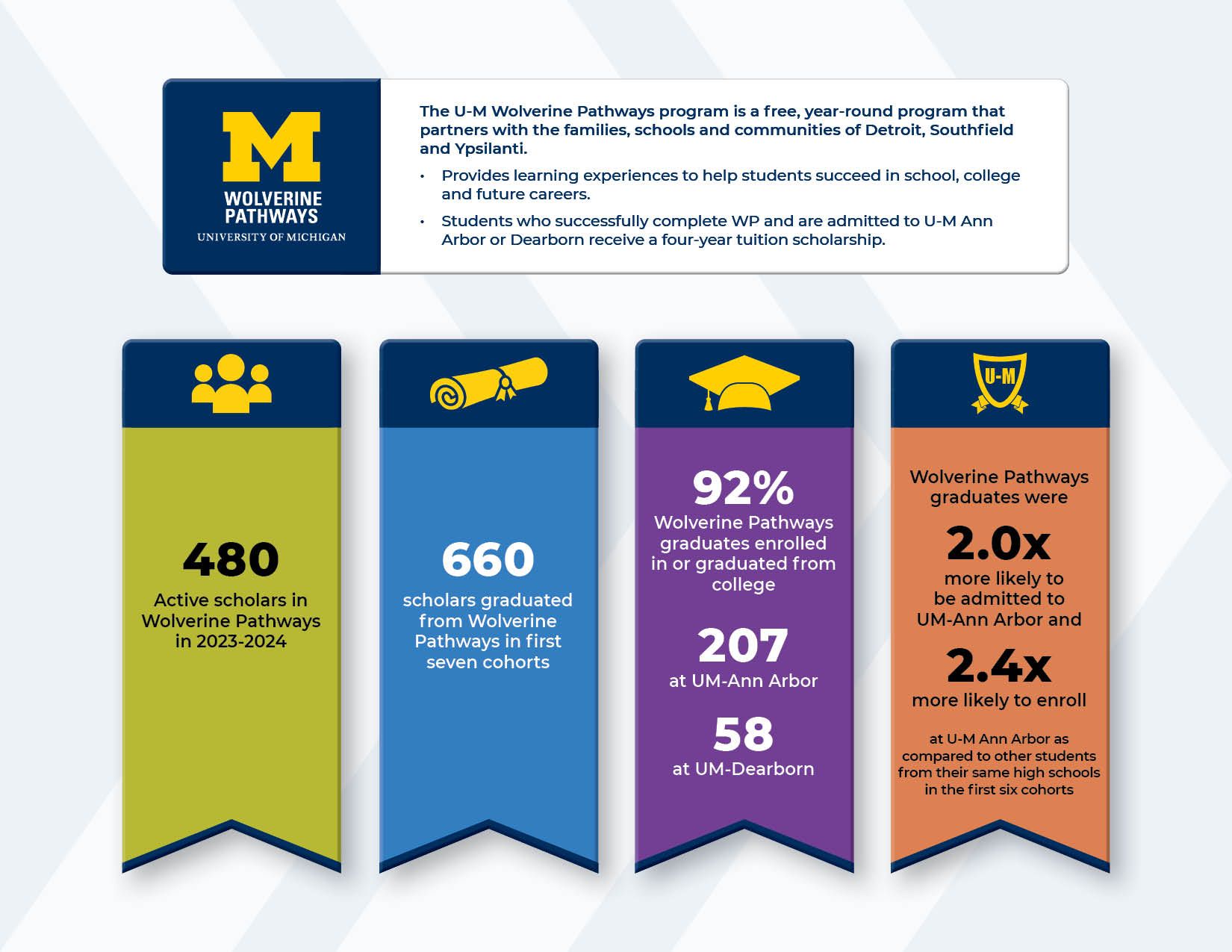
Text description of Wolverine Pathways graphic
The Wolverine Pathways program Is a free, year-round program that partners with the families, schools, and communities of Detroit, Southfield and Ypsilanti. The program provides learning experiences to help student succeed in school, college, and future careers. Students who successfully complete the Wolverine Pathways program and are admitted to U-M Ann Arbor or Dearborn, receive a four-year tuition scholarship.
This infographic reports on four key data points:
(1) there have been 480 active scholars within the 2023-2024 academic years.
(2) From the first seve cohorts, 660 scholars have graduated from the program.
(3) 92% of WP graduates enrolled in or graduated from college. 207 reported from U-M Ann Arbor and 58 at U-M Dearborn.
(4) WP graduates are 2.0 times more likely to be admitted to U-M Ann Arbor and 2.4 times more likely to enroll as compared to students from the same high schools in the first four cohorts.
LSA Collegiate Fellows
Click the image below to expand
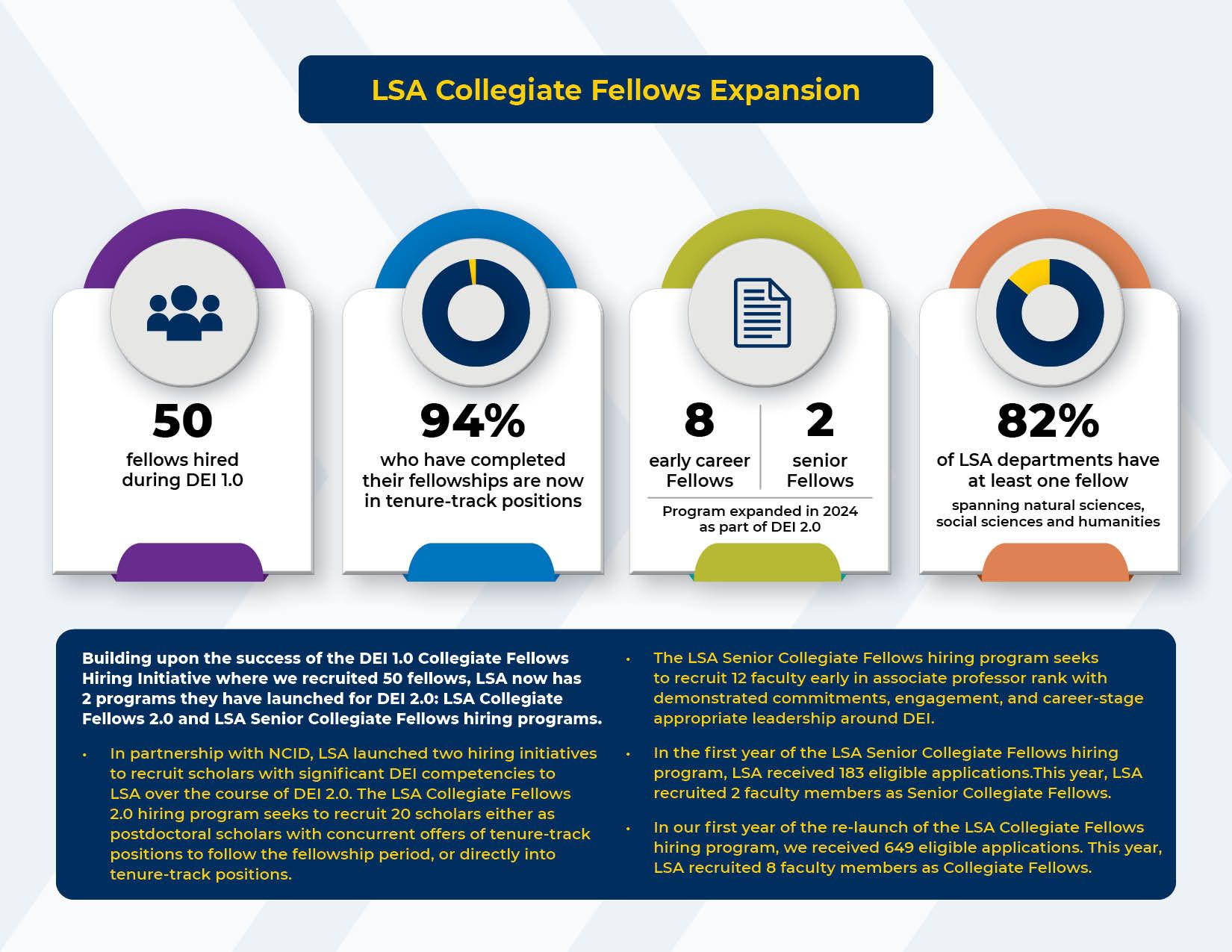
Text description of LSA Collegiate Fellows graphic
The LSA Collegiate Fellows program recruits early-career scholars in all liberal arts fields and prepares those scholars for possible tenure-track appointments in LSA, offering professional development opportunities through both LSA and the National Center for Institutional Diversity (NCID). LSA Collegiate Fellows data reports on five cohorts from 2016 - 2021.
Four data points provide an overview of the program impact:
(1) 50 fellows were hired during DEI 1.0.
(2) 94% of fellows who have completed their fellowship are now in tenure-track positions.
(3) 8 early career fellows and 2 senior fellows have been hired since the program expanded in 2024 as part of DEI 2.0
(4) 82% of LSA departments now have at least one fellow spanning natural sciences, social sciences, and humanities.
Additional notes:
Building upon the success of the DEI 1.0 Collegiate Fellows Hiring Initiative where we recruited 50 fellows, LSA now has
2 programs they have launched for DEI 2.0: LSA Collegiate
Fellows 2.0 and LSA Senior Collegiate Fellows hiring programs.
- In partnership with NCID, LSA launched two hiring initiatives • to recruit scholars with significant DEI competencies to
LSA over the course of DEI 2.0. The LSA Collegiate Fellows
2.0 hiring program seeks to recruit 20 scholars either as postdoctoral scholars with concurrent offers of tenure-track positions to follow the fellowship period, or directly into tenure-track positions. - The LSA Senior Collegiate Fellows hiring program seeks
to recruit 12 faculty early in associate professor rank with demonstrated commitments, engagement, and career-stage appropriate leadership around DEI. - In the first year of the LSA Senior Collegiate Fellows hiring program, LSA received 183 eligible applications. This year, LSA recruited 2 faculty members as Senior Collegiate Fellows.
- In our first year of the re-launch of the LSA Collegiate Fellows hiring program, we received 649 eligible applications. This year, LSA recruited 8 faculty members as Collegiate Fellows.
Infrastructures and Practices
Click the image below to expand
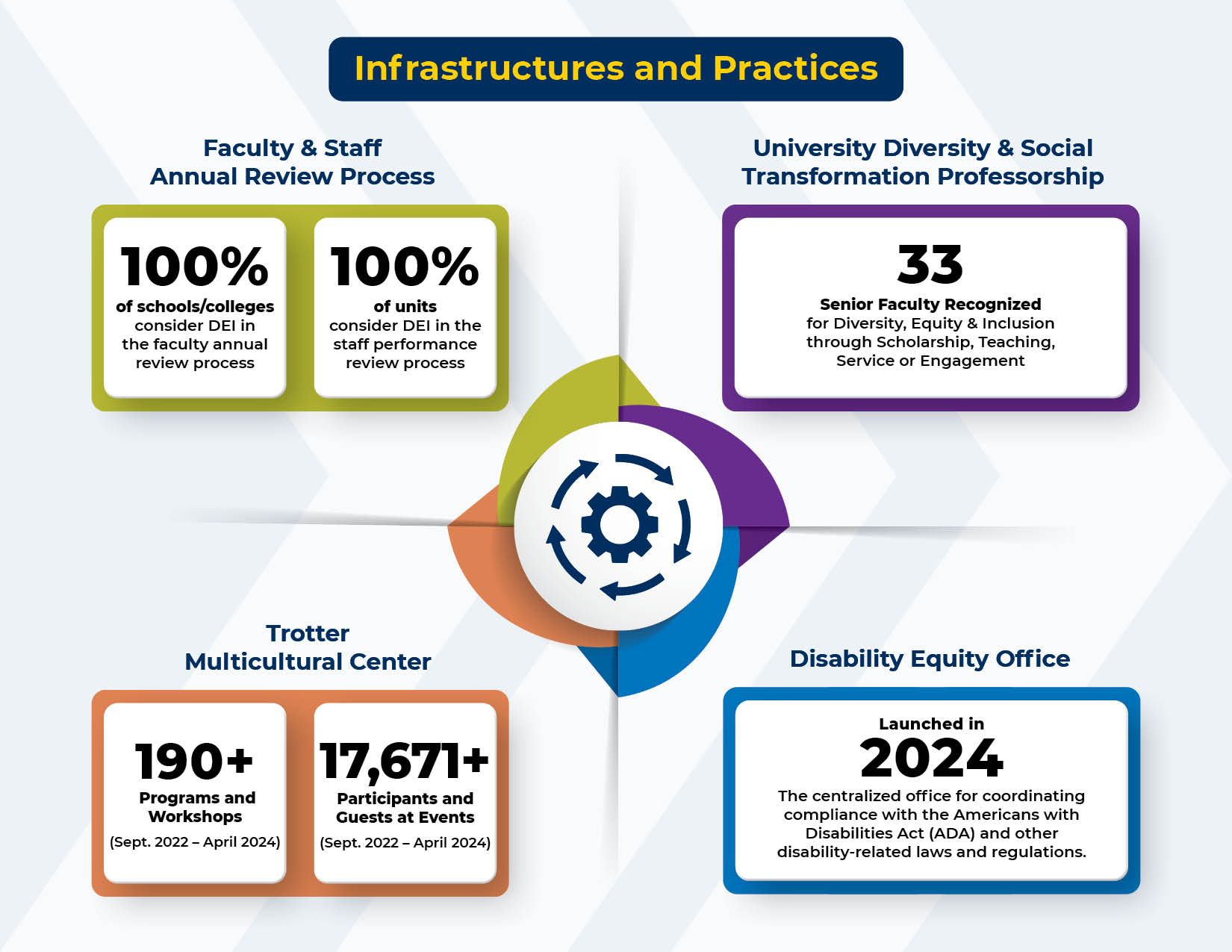
Text description of Infrastructure and Practices graphic
During the DEI 2.0 performance period, the University of Michigan has implemented new infrastructure toward addressing diversity, equity and inclusion efforts for all constituencies including students, faculty and staff.
This infographic identifies four areas where the infrastructure needs have been positively impacted in support of DEI efforts:
(1) The Faculty and Staff Annual Review Process reports 100% of schools and colleges consider DEI in the faculty annual review process and 100% of units consider DEI in the staff performance review process.
(2) The University Diversity and Social Transformation Professorship reports 33 Senior Faculty were recognized for diversity, equity and inclusion through scholarship, teaching, service or engagement.
(3) The Trotter Multicultural Center has hosted 190-plus programs and workshops since September 2022 to April 2024 and have hosted 17,671+ participants and guests at events from September 2022 through April 2024.
(4) The Disability Equity Office, launched in 2024, is now the centralized office for coordinating compliance with the Americans with Disabilities Act (ADA) and other disability-related laws and regulations.
DEI Skill Building
Click the image below to expand
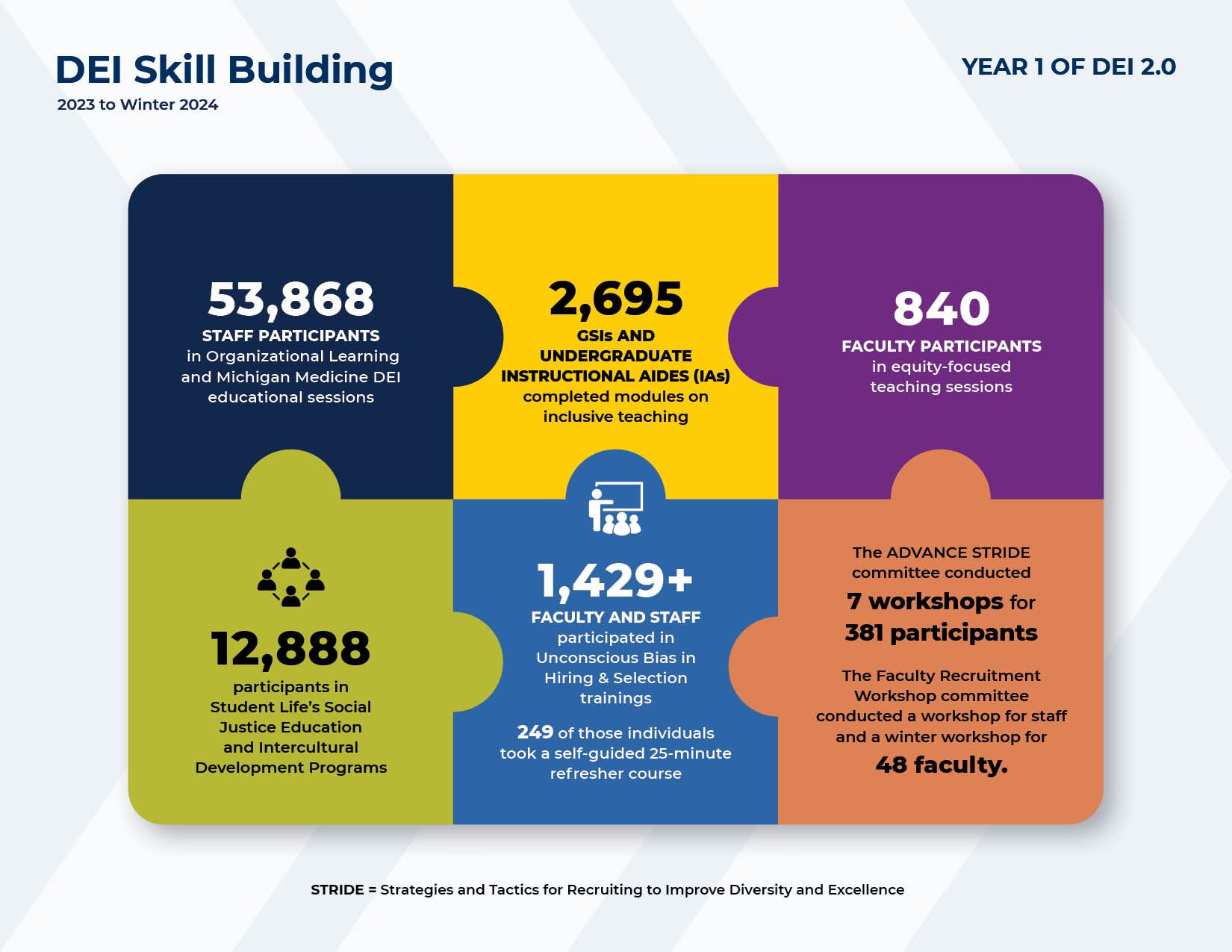
Text description of DEI Skill Building graphic
During the DEI 2.0 Year-1 performance period, University of Michigan units have developed DEI Skill Building programs tailored to address the specific needs of students, faculty, and staff.
This infographic provides six key statistics on DEI Skill Building impact during DEI 2.0 efforts from 2023 to Winter 2024:
(1) 53,868 staff members participated in Organizational Learning and Michigan Medicine DEI educational sessions.
(2) 2,695 plus GSIs and Undergraduate Instructional Aides completed modules on inclusive teaching.
(3) 840 faculty participants in equity-focused teaching sessions
(4) 12,888 participants in Student Life’s Social Justice Education and Intercultural Development Programs
(5) 1,429+ faculty and staff participated in Unconscious Bias in Hiring and Selection trainings; 249 of those individuals took a self-guided 25-minute refresher course.
(6) The ADVANCE STRIDE committee conducted 7 workshops for 381 participants. The Faculty Recruitment Workshop committee conducted a workshop for staff and winter workshop for 48 faculty.
M-PACT: Faculty Inclusive Excellence
Click the image below to expand
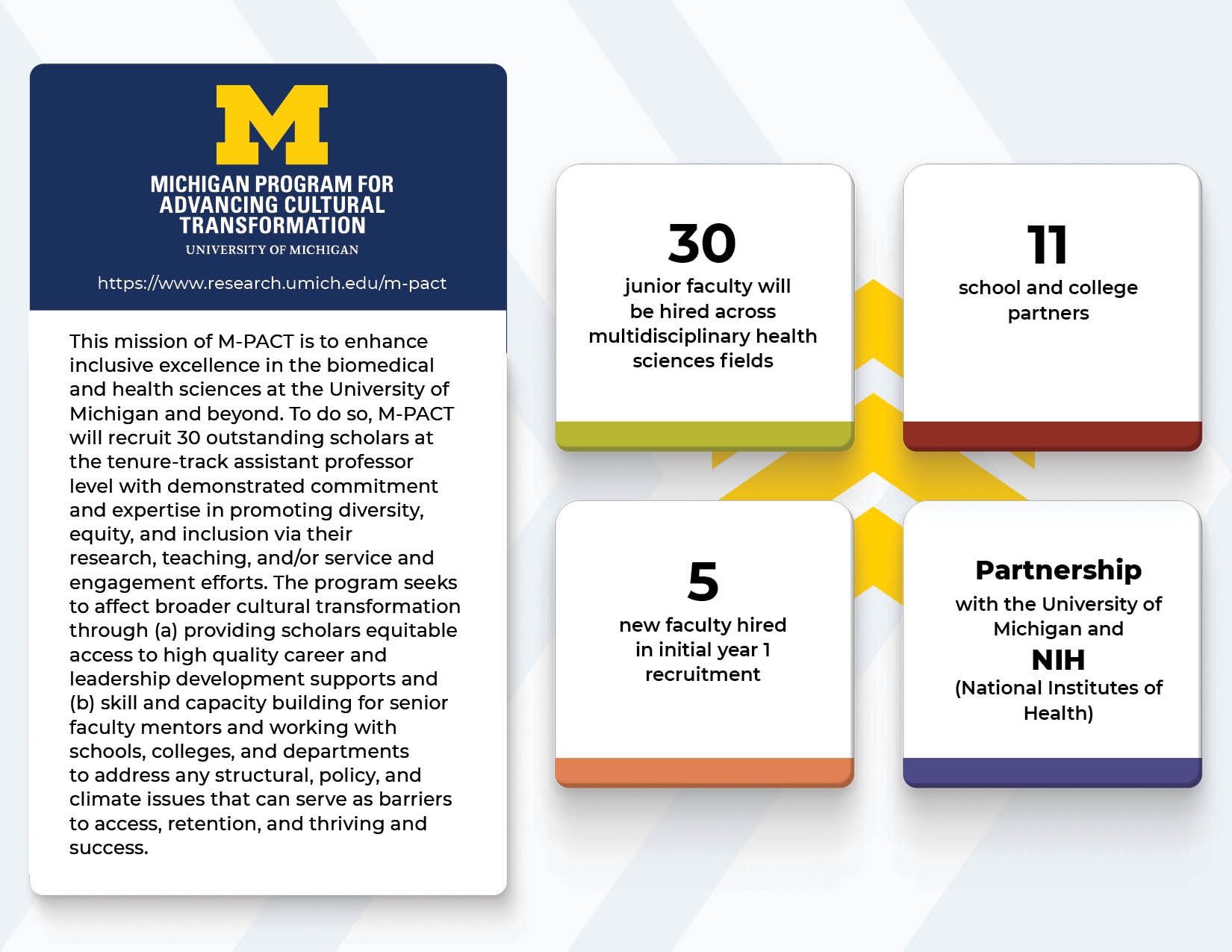
Text description of M-PACT: Faculty Inclusive Excellence graphic
This mission of Michigan Program for Advancing Cultural Transformation (M-PACT) is to enhance inclusive excellence in the biomedical and health sciences at the University of Michigan and beyond. To do so, M-PACT will recruit 30 outstanding scholars at the tenure-track assistant professor level with demonstrated commitment and expertise in promoting diversity, equity, and inclusion via their research, teaching, and/or service and engagement efforts. The program seeks to affect broader cultural transformation through (a) providing scholars equitable access to high-quality career and leadership development supports and (b) skill and capacity building for senior faculty mentors and working with schools, colleges, and departments to address any structural, policy, and climate issues that can serve as barriers to access, retention, and thriving and success.
The M-PACT infographic provides four key data points:
(1) 30 junior faculty will be hired across multidisciplinary health science fields.
(2) 11 schools and colleges partner as part of MPACT
(3) 5 new faculty hired in the initial year-1 recruitment.
(4) M-PACT is a partnership with the University of Michigan and National Institutes of Health
Inclusive History Project
Click the image below to expand
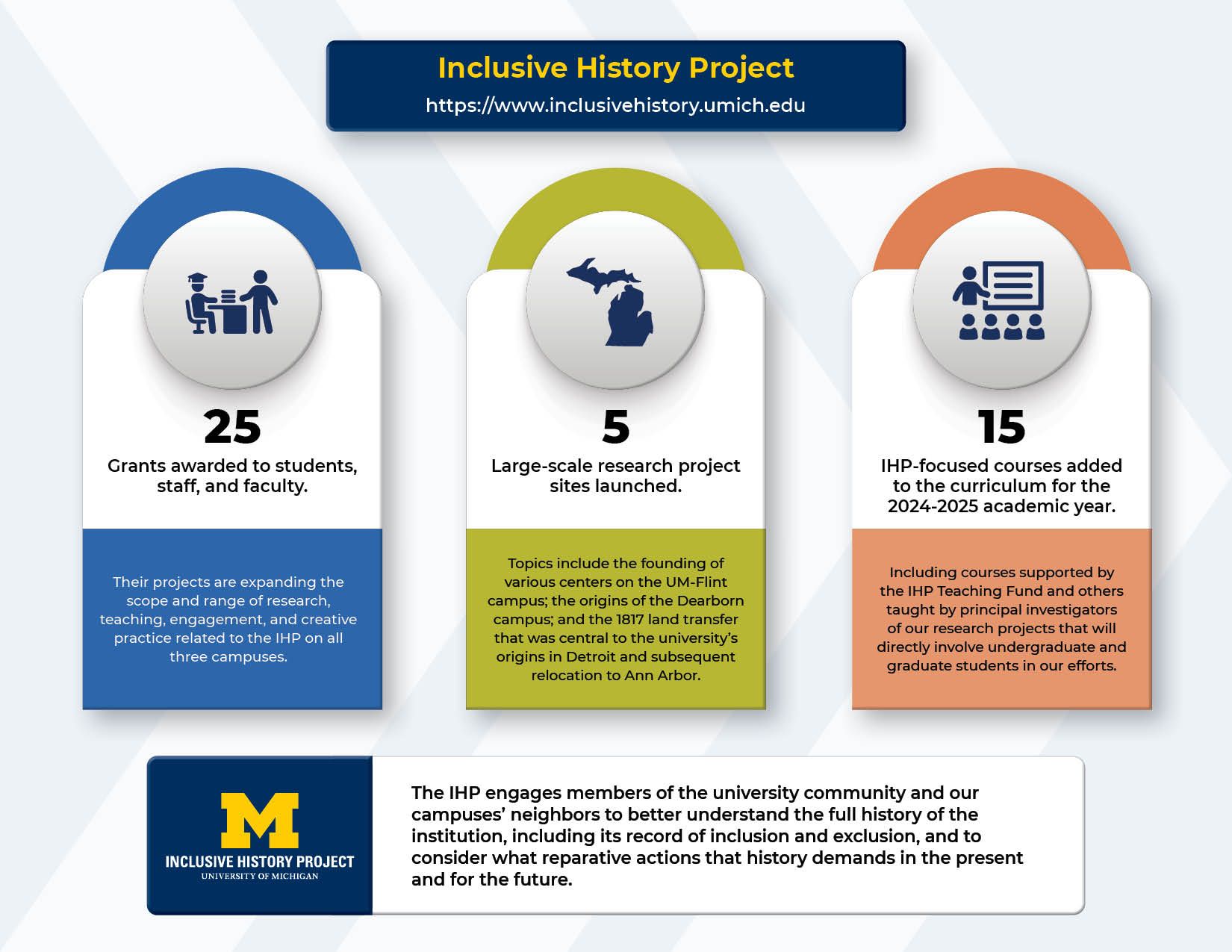
Text description of Inclusive History Project graphic
The Inclusive History Project (IHP) engages members of the university community and our campuses’ neighbors to better understand the full history of the institution, including its record of inclusion and exclusion, and to consider what reparative actions that history demands in the present and for the future.
Three key datapoints are reported in this infographic:
(1) 25 grants have been awarded to students, staff, and faculty - Their projects are expanding the scope and range of research, teaching, engagement, and creative practice related to the IHP on all three campuses.
(2) 5 large-scaled research sites have been launched - Topics include the founding of various centers on the UM-Flint campus; the origins of the Dearborn campus; and the 1817 land transfer that was central to the university’s origins in Detroit and subsequent relocation to Ann Arbor.
(3) 15 IHP-focused courses have been added to the curriculum for the 2024-2025 academic year - Including courses supported by the IHP Teaching Fund and others taught by principal investigators of our research projects that will directly involve undergraduate and graduate students in our efforts.
